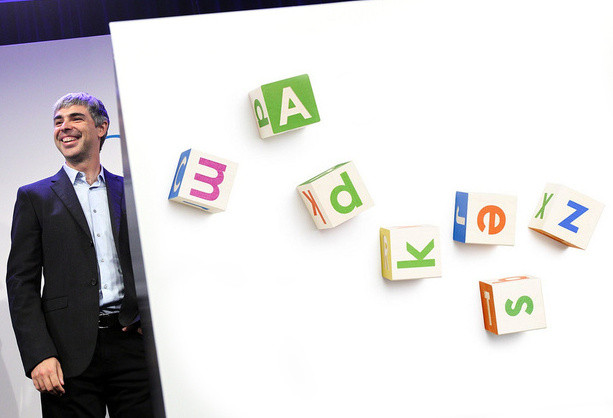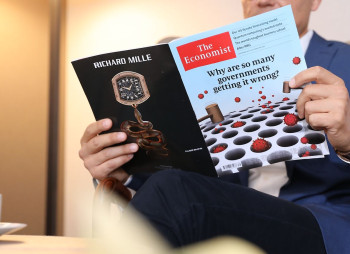On August 10th, 2015 Larry Page in his open speech announced that Google corporation transforms into the Alphabet holding. New company released Google from the list of subsidiary businesses, by changing them into the separate structures. Early after it was announced that the good old Google has gone, Sergey Brin noted the appearance of the new subsidiary company – Life Sciences.
Earlier, Life Science was a separate line in the laboratory of unusual projects of Google X. According to Brin, the workers have been developing the unusual projects for human life support for almost 3 years now. That how, they represented a lens, which could calculate the blood sugar level and was useful for those, who suffer from diabetes. However, because of some technical reasons the product hadn`t been released in mass production. Currently, Life Sciences is going to become the separate subdivision, hire a few tens of employees and continue developments in the healthcare.
After the end of structure changes in the Alphabet holding it will include 9 separate companies, with its own CEOs, budgets and focus areas. After these reforms, Alphabet started to look like the Warren Buffet company - Berkshire Hathaway, which consists of 40 companies from different business spheres. Alphabet has already been called the Berkshire Hattaway of the Internet.
Structure changes should help Alphabet to receive more, from each of its subdivisions, by the virtue of decreasing the level of bureaucracy and number of managers: there will be no need in obeying to Google CEO, who is engaged in the search business. In such a way, the firm gives more freedom for each company and organizes a distinct vertical power structure.
It bears reminding, that currently Larry Page is on the position of CEO of Alphabet, and has no direct relationship to the subsidiary companies. Sergey Brin will continue to manage the Google X department. Forbes has also enquired of about those, who took on the development of other subsidiary companies, and what are their areas of focus:
Google
CEO: Sundar Pichai
Areas of focus: search, maps, Android
Google still remains number one in the list of Alphabet. It is all about finances: it will bring more than 95% of income, according to the data for 2014 the revenues was $66 bln. Currently, company has been fully involved in development of search engines of Google Search, improvement of Google Maps and You Tube service, and also Android operating platforms with desktop Chrome OS.
Executive management of the Google was granted for Sundar Pichai, who had been playin the role of “grey cardinal” for almost two years already: he was the right hand man of Larry Page, ho occupied the post of CEO of the company from 2011 till 2015. There is an opinion, that one of the reasons of Alphabet creation is the desire to keep Pichai in the team. Recently, he was actively asked to take over the leadership of other companies, and to suppress this desire, Brin and Page put him in charge of the second biggest companies in the world.
Google X
CEO: Sergey Brin
Area of focus: new technologies
Subdivision, established in 2010, was created for implementation of the boldest ideas. In the numerous interviews, representatives of Google X noted, that they undertake the project, which were rejected by other companies. If the idea is somehow useful, they crunch numbers and create a prototype.
Currently, the company has brought to life a successful Project Loon, testing of which start this fall on Shri Lanka. Google Auto and Wing, the development of drones for parcel delivery, are also showing good results. And Google Glass is reported to fail. They are tryin to reanimate it, but there haven`t been seen any prototypes yet.
Since the beginning, the unspoken chief of Google X became Sergey Brin. One of Google founders got bored from the routine, and that is why he took on developing of unusual projects. Rumor has it that Alphabet was created to satisfy the similar desire of Larry Page: the responsibility for all projects was shifted on others, which gave Page time on his own projects.
Nest
CEO: Tony Fadell
Area of focus: smart home
Google acquired Nest Labs company as early as 2014 for $3,2 bln. At that point in time, Nest produced only thermostats and smoke sensors for the house. Recently, was represented the camera, which allows to keep watch over the house from the screen of the phone. At the additional charge, you could also get a subscription for recording the video in the online-storage. It is expected, that in the nearest future the company will present a full range of new gadgets.
Tony Fadell is famous not so much for being the founder of Nest, as for being the father for iPod – he was the one, who made Apple the well-known brand in the middle of the 00s. In 2008, Fadell left Cupertino, and started his own business.
Calico
CEO: Art Levinson
Area of focus: healthcare, biotechnologies
Calico appeared in 2013 as a separate company, however it was financed by Google. The founder of the project was Larry Page, who gathered the team of high-class scientists to fight with aging.
Arthur Levinson has been working for ages with biotechnologies. Before the switchover to Google he has had been working for 14 years in Genetech company, where he was the director of the board. The unspoken director of the Calico was Larry Page, as he was the one who launched the project.
Sidewalk Labs
СЕО: Den Doctoroff
Area of focus: urbanization
According to the information from the Sidewalk Labs site, the population of the cities will double. At the same time technologies, which are able to improve the living conditions, develop pretty fast. The task of the Sidewalk is to perform the integration and change ordinary cities into “smart” ones.
There is almost non information about the company in the Web, and Alphapet doesn`t even have any posts about Sidewalk`s being the part of the holding, on its site. However, the press office of the Google assures that company took its place in the new industry after all. Before Google, Den Doctoroff, the CEO of the project, has occupied a post of the chief of Bloomberg and worked with Marc Bloomberg, the former mayor of New-York city.
Google Ventures
CEO: Bill Maris
Aria of focus: investments
Google Ventures is engaged in investments on the early stages or during the active growth of the company. At the moment of launching of the fund in 2009, the amount of capital was equal to $100 mln. Since 2012, it was increased for $300 mln every twelve month. Currently, capital equal to $1,5 bln is under the management of the partners. In due time Venture made a successful investment in Nest Labs, and for now, the main achievement was investment in Uber in 2013.
The Ventures fund is under the management of Bill Maris. Due to the productive work in Google Ventures he was in the list of the most successful investors of Silicon Velley for a few times. Currently he is actively investing in companies, connected to new technologies and biotech.
Google Capital
CEO: David Levy
Area of focus: investments
If Ventures invests in companies, in which Google or other companies may be interested, Capital represents solid investments in order to earn extra profit. For the last two years, the money has been invested in 12 companies, among which are financial corporations, data processing services and online educational services,
David Levy had implemented deals in Google before launching of Capital. He was able to set up around 100 investment and acquisition operations, till 2013. Before Google he was an entrepreneur and was engaged in investment operations.
Access and Energy
CEO: Craig Barret
Area of focus: internet projects
Access and Energy company is unpopular among regular users. The main product of the company is Google Fiber, th cable operator and internet provider, currently is available only in a few US states, and has less than 30 000users. The subdivision was established in 2013, and since then it has been working on internet projects, including the project of launching of 180 mini-satellites on the Earth's orbit. The main goal is to make internet more accessible, and as a result give Google the opportunity to earn even more money.
Craig Barret was invited to Google, to become the CEO of the new project. Earlier he worked as a director of Atheros Communications telecommunication company.
Life Sciences
CEO: Andy Conrad
Area of focus: healthcare
Life Sciences will continue to work on the healthcare projects. In the company, under the management of Conrad currently work 150 people, but this number will be increased in the nearest future. There is no information about the new developments or plans of the company, but Sergey Brin made a mention of the further clinical examinations. The main goal is the disease finding and medicine development.
Andy Conrad is one of the founders of National Institute of Genetics, California Health & Longevity Institute; also worked as a Chief Scientific Adviser in the scientific campus of Northern Carolina.








